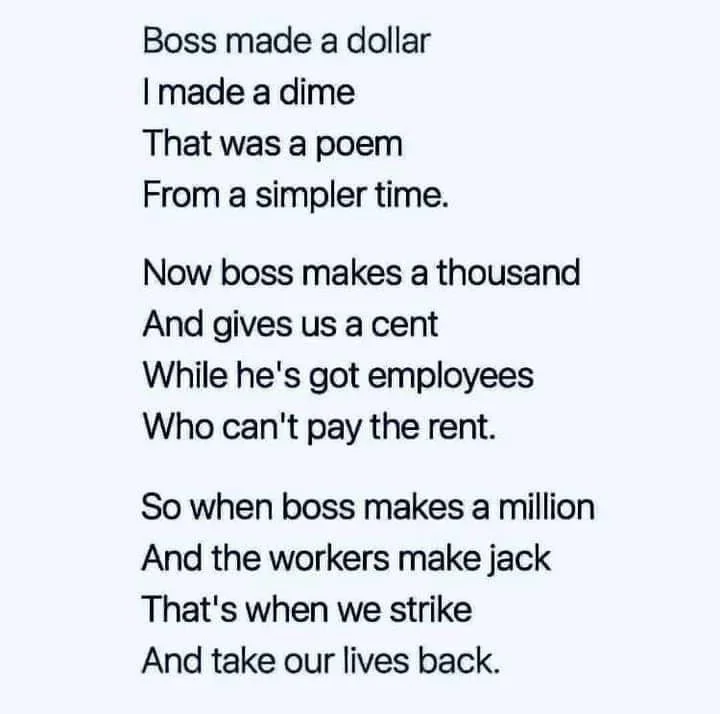Continuing a discussion on an old thread, perhaps we can ask: "Will there be police and prisons under socialism?"
I'm sure there will be a number of different answers from socialists, but this is c/abolition, so of course the answer would be no.
But wait, one might say, weren't and aren't there police and prisons in "actually existing socialism"? Yes, but for varying reasons, the "socialism" of these projects was merely the political ideology of their ruling parties, not in terms of their mode of production. All of these countries had wage-labor, proletarianization, money, commodities, et cetera—all features of a capitalism. Because they had these features of capitalism, these state socialist projects necessarily needed police and prisons to enforce the rule of state capital.
When Marx talked about socialism, he most clearly outlines it in his Critique of the Gotha Program where he uses the term "lower-phase communism" that Second International Marxism and later pre-Bolshevized Comintern Marxism interpreted as "socialism." In socialism or lower-phase communism, the state is already abolished because classes are already abolished. In doing so, we can necessarily expect the cruelest features of the state like police and prisons are necessarily also abolished.
Police and prisons are historically contingent to class society. They serve as a mode of upholding class society. Across Europe and North America during the development of capitalism, police and prisons were used to enforce the rule of wage-labor and force previously non-proletarian peoples into proletarianization. These institutions would drive people off their land, enclose the commons, and then impose regimes of terror to enforce class society.
But how about, a socialist might ask, the enforcement of class rule of the proletariat? The dictatorship of the proletariat? First, it is important to note that the dictatorship of the proletariat is not yet socialism. It is the transition period to socialism. Second, the dictatorship of the proletariat is indeed a class dictatorship, just like the dictatorship of the bourgeoisie we currently live under. Third, the class dictatorship of the proletariat cannot look like previous modes of class dictatorship because it is a class dictatorship for the transition from a class society to a classless society, not a transition from a class society to another class society. Previous modes of class dictatorship used the terror of police and prisons to transition from a monarchist system to a republican system, or the class dictatorship of the aristocracy to the class dictatorship of the bourgeoisie. The proletarian class dictatorship is different in that it is a class dictatorship that abolishes class distinctions, the most important of which is proletarianization. Logically, if proletarianziation needs police and prisons to be enforced, then the class dictatorship to abolish proletarianization likewise does away with police and prisons, simply because one cannot use the enforcement of proletarianization to do away with proletarianization.
However, the crucial feature of class dictatorship is its dictatorship, the ability for a class to enforce its will on all other classes. We have previously noted here that previous modes of class dictatorship does this using police and prisons. How is proletarian class dictatorship supposed to do this without police and prisons? Very simply, the power of a proletariat as a class-for-itself does not come from the barrel of a gun or a ballot box, but by their ability to subvert what they are as proletarianized beings. This does not mean that there will be no violence, far from it, but that this violence is ordered towards subversion of class society rather than reproducing it. Commonly, Second International Marxism, especially as embodied by Lenin in State and Revolution, advocates for a whole armed proletariat as opposed to special bodies of armed force (e.g. police and prisons). For whatever reason, Lenin disregarded this when the Bolsheviks took power in Russia, thus reproducing class society and all that that entailed, leading the Soviet Union down a path of an unambiguous class society where the proletariat continued to be proletarianized.
Abolition communism means moving beyond this failure to abolish police and prisons under a transitional period and forwarding abolition and communization in its place.
So no, there would not be police and prisons in socialism nor in the transitional period to it, unless of course that transitional period was not transitioning to socialism at all but back to capitalism.

Thanks, that helps a lot.